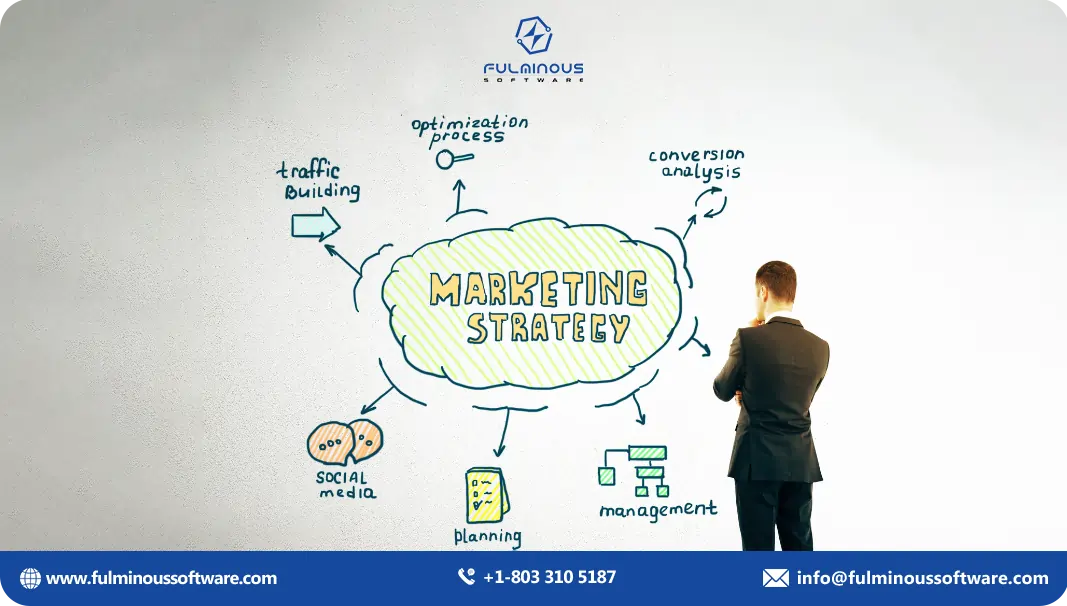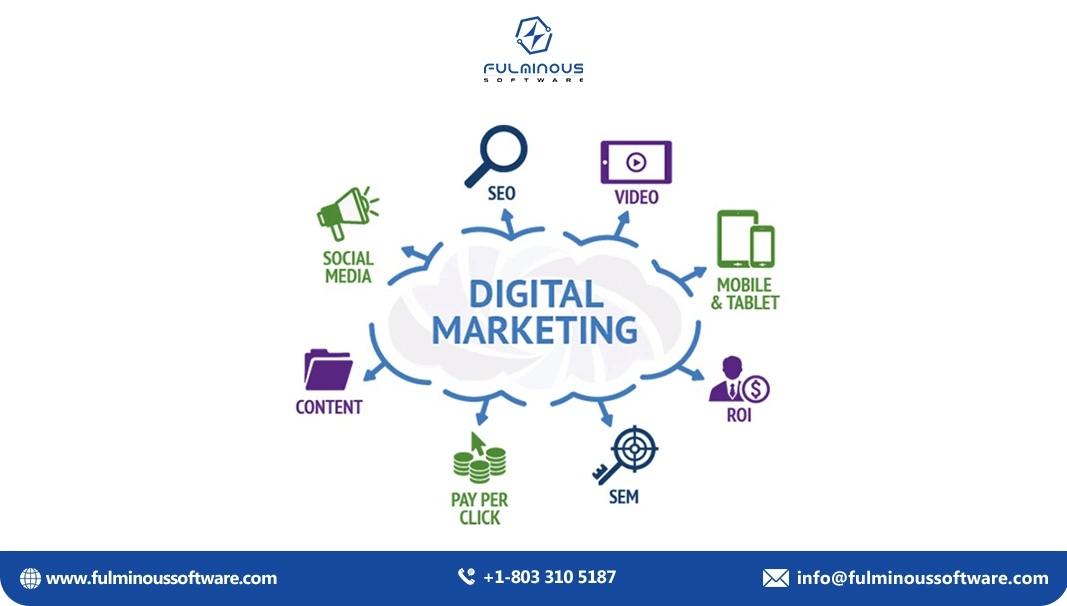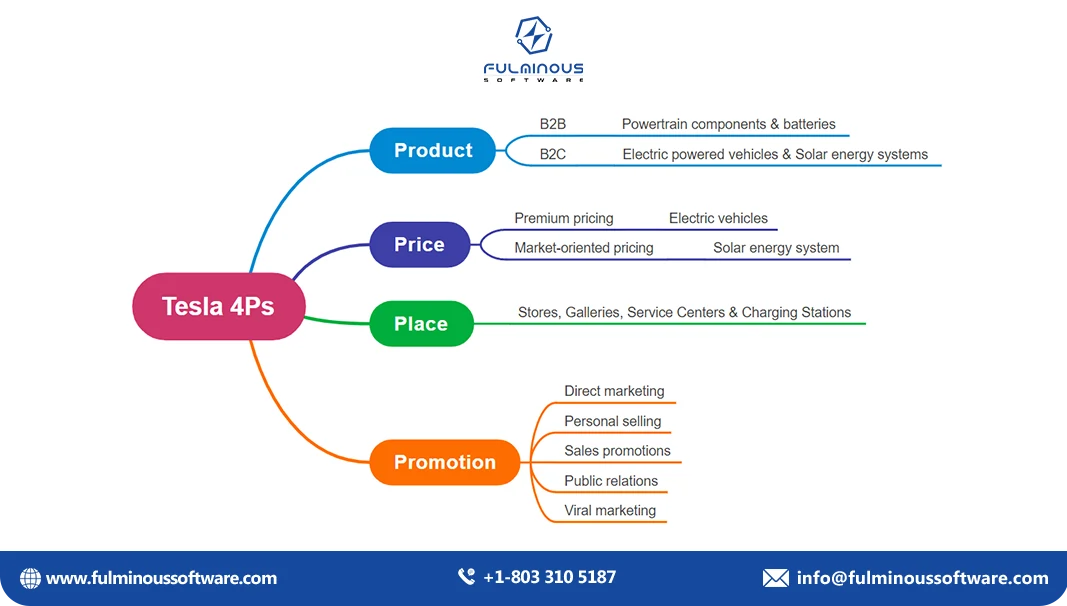Effective Marketing Strategies for Manufacturing Companies
Manish Kumawat
Last Updated on: 07 October 2025
For centuries, manufacturing has been seen as a behind-the-scenes operation, a machine churning out products without much fanfare. But today, that perception is outdated. Manufacturing companies need to have strong power to captivate consumers. Marketing is the key to achieving this. However, the reality is manufacturing marketing is entirely different from general marketing. The scarcity of powerful marketing strategies is the major concern of businesses in the manufacturing industry. Here, let's debunk the myth and explore the innovative marketing strategies that are transforming manufacturing firms.
Why Marketing Matters for Manufacturing Businesses

Let's say you've got a super-cool handmade leather backpack. It's tough, stylish, and perfect for adventurers. However, how can it be made known to others? That's where marketing comes in.
Imagine you're at a bustling market. You've got your backpack on display, but no one seems to notice. Now, picture yourself with a colorful sign that says, "Handmade Leather Backpacks, Perfect for Your Next Adventure." Suddenly, people start stopping by to check it out.
It's like telling your friends about your awesome new band, except you're doing it to a whole bunch of strangers.
Here's why marketing is a big deal for makers:
- Get the word out: Marketing helps people find your stuff.
- Make a splash: Good marketing can make your brand stand out from the crowd.
- Build a following: Marketing helps you connect with people who love what you make.
- Keep up with the times: The world changes fast, and so do people's tastes.
Marketing is like giving your business a boost. It's the secret sauce that can turn your cool idea into a thriving business.
Let’s see some statistics:
- In 2024, value added in the manufacturing sector is expected to reach US$8.8 trillion. A compound annual growth rate (CAGR 2024–2029) of 1.15% is anticipated. (source)
- Usually, manufacturers allocate 1-3 percent of their overall earnings on marketing. (source)
- Digital marketing is used by 98% of manufacturers to produce sales-qualified leads. (source)
- Email marketing is ranked as the most successful digital marketing tactic by 18% of manufacturing marketers. (source)
The Difference Between General Marketing and Marketing for Manufacturing
While both general marketing and marketing for manufacturing share the goal of promoting products and services, several key differences arise due to the unique characteristics of the manufacturing industry.
| General Marketing | Marketing for Manufacturing |
|---|---|
| Broad Scope: EGeneral marketing encompasses a wide range of industries and products, from consumer goods to services. | Specialized Focus: Tailored specifically to the manufacturing industry, considering factors such as supply chains, production processes, and industry regulations. |
| Focus on Consumer Behavior: Its primary objective is to comprehend the requirements, preferences, and buying habits of its customers. | Technical Knowledge: Requires a deep understanding of manufacturing processes, product specifications, and industry trends. |
| Diverse Channels: Utilizes a variety of marketing channels, including traditional advertising, social media, public relations, and digital marketing. | B2B Focus: Often involves business-to-business (B2B) marketing, targeting other businesses as customers. |
| Emphasis on Brand Building: Aims to create a strong brand identity and reputation. | Emphasis on Product Features: Highlights technical aspects, quality, and performance of products. |
| Industry-Specific Channels: Utilizes trade shows, industry publications, and specialized marketing platforms. |
Key Differences in Focus
- Target Audience: General marketing focuses on consumers, while manufacturing marketing targets businesses and consumers.
- Messaging:Manufacturing marketing often emphasizes product features, technical specifications, and industry certifications, while general marketing may focus on lifestyle benefits or emotional appeal.
- Channels: Manufacturing marketing utilizes industry-specific channels like trade shows, while general marketing relies on traditional advertising and social media.
Understanding these differences is crucial for effective marketing in the manufacturing sector.
Strategies are Plenty but Effective Ones are Less

When it comes to strategies, there’s no shortage of ideas out there. But let’s be honest, not all strategies are created equal. You’ll find plenty of suggestions floating around, but only a handful of them really deliver results. Something may not work for you just because it did for someone else.
Effective strategies are usually simple, targeted, and based on a deep understanding of your goals and audience. Instead of spreading yourself thin across multiple tactics, focus on a few key strategies that align with what you’re trying to achieve. Test them, adapt them, and always keep an eye on the results. Flexibility is essential as what works now could not work tomorrow. In the end, it’s all about quality over quantity when it comes to choosing the right strategies.
Components of Marketing for Manufacturing
Marketing for manufacturing companies involves a multifaceted approach that considers the unique characteristics of the industry. Here are some key components:
1. Market Research and Analysis
- Industry Analysis: Understanding the current state of the manufacturing industry, including trends, challenges, and opportunities.
- Competitor Analysis: Recognizing the advantages, disadvantages, and marketing approaches of the main rivals.
- Target Market Identification: Defining the specific groups of customers (businesses or consumers) that the company aims to serve.
- Customer Needs and Preferences: Researching the needs, preferences, and buying behaviors of target customers.
2. Product Positioning and Branding
- Unique Selling Proposition (USP): Identifying the distinctive features or benefits that set the company's products apart from competitors.
- Branding: Developing a strong brand identity, including a logo, tagline, and brand messaging that resonates with the target market.
- Product Positioning: Determining how the company wants its products to be perceived in the market.
3. Marketing Mix (4 Ps)
- Product: Developing and refining product offerings to meet customer needs and preferences.
- Price: Setting competitive and profitable pricing strategies.
- Place (Distribution): Establishing effective distribution channels to reach target customers.
- Promotion: Implementing various marketing communication tactics to promote products and build brand awareness.
4. Marketing Communications
- Public Relations: Promoting goodwill among stakeholders and the media.
- Advertising: Utilizing various advertising channels, such as print, digital, and broadcast media.
- Sales Promotions: Offering incentives, discounts, or contests to stimulate sales.
- Direct Marketing: Reaching out directly to customers through email, catalogs, or direct mail.
- Content Marketing: Creating and sharing valuable content (e.g., blog posts, articles, videos) to attract and engage customers.
5. Digital Marketing
- Website Development: Building a website that is both professional and easy to use.
- Search Engine Optimization (SEO): Increasing the website's exposure in search engine results through optimization.
- Pay-Per-Click (PPC) Advertising: Running advertisements on social media and search engines online.
- Social Media Marketing: Establishing and participating in a social media network online.
- Email Marketing: Building and nurturing email lists to send targeted marketing messages.
6. Sales Enablement
- Sales Training: Giving sales teams the information, abilities, and resources they require in order for them to succeed.
- Sales Tools: Providing sales teams with CRM software, sales presentations, and other resources.
- Sales Support: Offering sales teams support and assistance when needed.
By effectively implementing these components, manufacturing companies can build strong brands, attract new customers, and drive sales growth.
Remember This is an Era of Digital Marketing
In this era where people seek and buy products online, marketing for manufacturing companies has changed a lot. It’s not just about trade shows or cold calls anymore; digital marketing is where the real action is.

Ensuring your website is excellent is the first step. Then, social media is a game-changer. Platforms like LinkedIn, Facebook, and even Instagram can help you connect with clients, share updates, and show off your products.
Don’t forget about SEO (Search Engine Optimization). When customers search for products similar to yours, this helps your website appear. Pair that with email marketing, and you’ve got a solid foundation for digital marketing.
Running Pay-Per-Click (PPC) ads on Google or social media can quickly get your products in front of the right people. The digital world lets you reach more customers, track results, and adapt faster.
12 Effective Marketing Strategies for Manufacturing Companies
Effective marketing techniques are essential for manufacturing businesses to expand, draw in clients, and differentiate themselves from rivals. These are a few simple tactics for manufacturing company marketing.
1. Create a Simple, Professional Website
A manufacturing website is like your company’s store on the internet. It needs to look nice, be easy to use, and show what your company does.
- Showcase Products Clearly: Add clear pictures and descriptions of the products you make.
- Contact Information: Make sure your phone number, email, and address are easy to find.
- Mobile-Friendly: Ensure your website works well on smartphones as many people use their phones to search online.
2. Build Social Media to Connect More People
Social media platforms like Facebook, LinkedIn, and Instagram are not just for sharing personal stuff. Manufacturing companies can use these platforms for marketing.
- Post Regularly: Share updates about your products, the work you’re doing, and any new services.
- Show Behind-the-Scenes: Give a glimpse of your factory, how things are made, and who is making them.
- Answer Questions: If customers or followers ask questions, answer them quickly.
3. Use Search Engine Optimization (SEO)
SEO is a way to help your website show up when people search for things like the products you make. When your website is optimized for search engines, more people can find you.
- Right Keywords: Think of the words people might use to search for your products.
- Update Content Regularly: Google likes websites that stay updated. Add new blogs or product information to show that your company is active.
- Fix Website Errors: Fix broken links or slow load times to rank higher in searches.
4. Send Regular Emails
Email marketing is a great way to keep your customers informed about new products, special deals, or company news.
- Newsletters: Send newsletters with updates about your business and the industry.
- Offer Discounts: Share exclusive offers through email.
- Follow-Up: After a purchase, send a thank-you email or check if the customer needs any help with the product.
5. Use Pay-Per-Click (PPC) Advertising
PPC ads help you get noticed quickly. These are ads that show up on search engines or websites, and you only pay when someone clicks on the ad.
- Target the Right Audience: With PPC, you can choose who sees your ads.
- Quick Results: Unlike SEO, which takes time, PPC ads give you instant visibility.
6. Attend Industry Events and Trade Shows
Trade shows are events where companies from the same industry come together to show off their products.
- Showcase Products: Bring samples of your products to show people.
- Network: Meet people in the industry and exchange contact information.
- Learn: You can also learn a lot by attending these events.
7. Create Helpful Content (Blogs, Videos, Guides)
Content marketing is the process of producing informative content that will benefit your target audience.
- Answer Common Questions: Write blogs or make videos that answer questions your customers often ask.
- Share Knowledge: Explain how your products help solve common problems in the industry.
- Post Consistently: Keep posting new content regularly.
8. Showcase Customer Success Stories
One of the best ways to build trust with new customers is to share stories of people who have used your products and had a great experience.
- Ask for Reviews: After a customer buys your product, ask them to leave a review or share how your product helped them.
- Create Case Studies: Share detailed stories about how your product solved a problem for a customer.
9. Use Data and Analytics to Improve
Data is powerful. By tracking how your marketing strategies are performing, you can see what’s working and what’s not.
- Track Website Visitors: Use tools like Google Analytics to see how many people are visiting your website and what they are looking at.
- Adjust Strategies: If a certain strategy isn’t bringing in new customers, change it up.
- Measure Results: Whether it’s emails, ads, or social media, always measure how well each marketing effort performs.
10. Build Strong Relationships with Customers
The secret to success in manufacturing is building lasting relationships with customers.
- Follow-up: After a sale, check in with the customer to make sure they are satisfied with the product.
- Offer Great Customer Support: Be quick to help when customers have questions or problems.
- Loyalty Programs: Offer special deals or discounts to customers who have bought from you before.
11. Stay Updated with Technology
The world is changing fast, and so is technology. Manufacturing companies should keep up with new tools and trends.
- Automate Marketing: Use tools that help send emails or post on social media automatically.
- Use CRM Software: Customer Relationship Management (CRM) software helps you track your customers and their needs.
- Stay Active on Digital Platforms: Always seek out new methods to engage your audience, whether through virtual trade shows or social media capabilities.
12. Collaborate with Other Companies
Sometimes, working with another company can help you both.
- Partner with Suppliers: If you work with suppliers, think about doing joint marketing efforts.
- Host Webinars Together: Webinars are online events where you teach something to your audience.
- Cross-Promote Products: Recommend each other’s products to your customers.
Common Challenges in Manufacturing and Their Solutions
Manufacturing companies face a myriad of challenges in today's competitive landscape.
| Challenge | Solutions |
|---|---|
| Reaching the Right Audience | Use targeted ads and content marketing to focus on specific industries and decision-makers. |
| Lack of Brand Awareness | Create consistent branding, engage on social media, and attend industry events. |
| Complicated Products | Simplify product details with visuals, case studies, and easy-to-read content. |
| Long Sales Cycles | Nurture leads with email marketing, webinars, and follow-ups to keep them engaged. |
| Standing Out from Competitors | Highlight unique features, offer case studies, and showcase customer success stories. |
| Limited Online Presence | Invest in SEO, website optimization, and social media to increase online visibility. |
| Generating Leads | Use PPC, content marketing, and lead magnets like ebooks or free consultations. |
| Building Trust with New Clients | Provide testimonials, case studies, and transparent pricing to build credibility. |
| Measuring Marketing Success | Use analytics tools to track website traffic, lead conversions, and ROI for campaigns. |
| Budget Constraints | Focus on cost-effective strategies like social media and content marketing to maximize reach. |
AI and IoT: Marketing Magic for Manufacturing
Think of AI and IoT as a superhero duo for manufacturing marketing. AI is the brain, analyzing data and figuring out what customers want. IoT is the eyes and ears, collecting information from smart devices.
Together, they can:
- Personalize marketing: Tailor messages to each customer based on their likes and dislikes.
- Predict the future: Forecast demand and avoid stockouts.
- Make customers happy: Track products, predict maintenance, and offer quick support.
- Make smart decisions: Analyze market trends and outsmart competitors.
- Build a strong brand: Engage with customers online and create personalized content.
With AI development and IIoT development, manufacturers can create marketing campaigns that are more targeted, effective, and customer-focused. It's like having a marketing wizard on your side!
Learning from the Best: Effective Marketing Strategies for Manufacturing Companies
By studying the strategies of leading manufacturing companies, we can gain valuable insights into effective marketing approaches.
Case Study 1: Tesla

The manufacturer of electric vehicles, Tesla, has transformed the automotive sector with its creative marketing approaches. Among the most important things Tesla can teach us are:
- Strong Brand Storytelling: Tesla has been effective in positioning itself as a disruptor in the automobile sector by highlighting its goal of quickening the global switch to renewable energy.
- Direct-to-Consumer Sales Model: Tesla has created a direct relationship with its customers by bypassing traditional dealerships, enabling a more customized experience.
- Social Media Engagement: To interact with its customers, foster brand loyalty, and create excitement about its products, Tesla has made use of social media sites.
Case Study 2: Patagonia

Due to its dedication to sustainability and moral business methods, outdoor apparel and equipment brand Patagonia has amassed a devoted following of customers. Salient insights from Patagonia comprise:
- Purpose-Driven Marketing: By focusing on environmental issues and social responsibility, Patagonia has created a strong emotional connection with its customers.
- Customer-Centric Approach: Patagonia prioritizes customer satisfaction and feedback, constantly improving its products and services based on customer input.
- Community Engagement: The company actively supports environmental causes and encourages its customers to participate in conservation efforts.
Case Study 3: GE Additive

GE Additive, a subsidiary of General Electric, is a leader in additive manufacturing (3D printing) technology. Key learnings from GE Additive include:
- Educational Marketing: The company has invested heavily in educating the market about the benefits and potential applications of additive manufacturing.
- Strategic Partnerships: GE Additive has formed partnerships with other companies and research institutions to accelerate the adoption of its technology.
- Focus on Industry-Specific Solutions: By tailoring its products and services to specific industries, GE Additive has been able to address the unique needs of its customers.
Key Takeaways for Manufacturing Companies
- Focus on brand storytelling: Create a compelling narrative that resonates with your target audience.
- Prioritize customer experience: Deliver amazing customer service and value.
- Leverage digital marketing: Reach out to your customers with email marketing, social media, and content marketing.
- Embrace sustainability and social responsibility: Align your company's values with the needs of today's consumers.
- Invest in innovation: Continuously explore new technologies and improve your products and processes.
Conclusion
Marketing isn't just about selling things. It's about building relationships with people, being honest, and sharing your company's story. In manufacturing, this is like giving your products special powers that make them different from others.
We're in a digital world now. It's time to stop using old-fashioned marketing methods and start using the Internet. The above-mentioned manufacturing marketing strategies can assist you in achieving marketing success.
The success stories of manufacturing companies like Tesla, Patagonia, and GE Additive are inspirations for other manufacturers. Successful software companies like Fulminous Software can assist you with their experience in technology and market knowledge to implement successful manufacturing marketing strategies.
Don't wait any longer. Improve your marketing and watch your business succeed!
FAQs
- Q1: Why is marketing important for manufacturing companies?
- A: Marketing helps manufacturers build brand awareness, attract customers, and differentiate their products from competitors in a highly competitive industry.
- Q2: What is digital marketing for manufacturers?
- A: Digital marketing for manufacturers involves promoting products through online channels like websites, social media, SEO, email marketing, and PPC advertising.
- Q3: How can manufacturers use SEO effectively?
- A: Manufacturers should use relevant keywords, regularly update website content, and ensure fast loading speeds to improve visibility on search engines like Google.
- Q4: Which social media sites are most effective for manufacturing companies?
- A: LinkedIn, Facebook, and Instagram are effective platforms where manufacturers can connect with industry professionals, share content, and promote products.
- Q5: How does PPC advertising benefit manufacturing businesses?
- A: PPC ads help manufacturers quickly reach a targeted audience by showing ads to potential customers who search for relevant industry products or services.
- Q6: Why are case studies important for manufacturers?
- A: Case studies showcase successful projects, helping build credibility and demonstrate how a manufacturer’s products solve specific customer problems.
- Q7: What is content marketing for manufacturing companies?
- A: Content marketing involves creating valuable content like blogs, videos, and guides that educate customers, showcasing products and expertise.
- Q8: How can email marketing help manufacturers?
- A: Email marketing keeps customers informed about new products, industry news, and special offers, fostering long-term relationships and brand loyalty.
- Q9: What are the benefits of using CRM software in manufacturing?
- A: CRM software helps manufacturers manage customer relationships, track interactions, and streamline communication, improving customer service and sales processes.
HIRE A TOP SOFTWARE DEVELOPMENT COMPANY

 Verified
Expert in Software & Web App Engineering
Verified
Expert in Software & Web App Engineering
I am Manish Kumawat, co-founder of Fulminous Software, a top leading customized software design and development company with a global presence in the USA, Australia, UK, and Europe. Over the last 10+ years, I am designing and developing web applications, e-commerce online stores, and software solutions custom tailored according to business industries needs. Being an experienced entrepreneur and research professional my main vision is to enlighten business owners, and worldwide audiences to provide in-depth IT sector knowledge with latest IT trends to grow businesses online.
Partner with Top-Notch Web Application Development Company!
Discuss your Custom Application Requirements on info@fulminoussoftware.com or call us on +1-903 488 7170.
15 Days Risk-Free Trial

